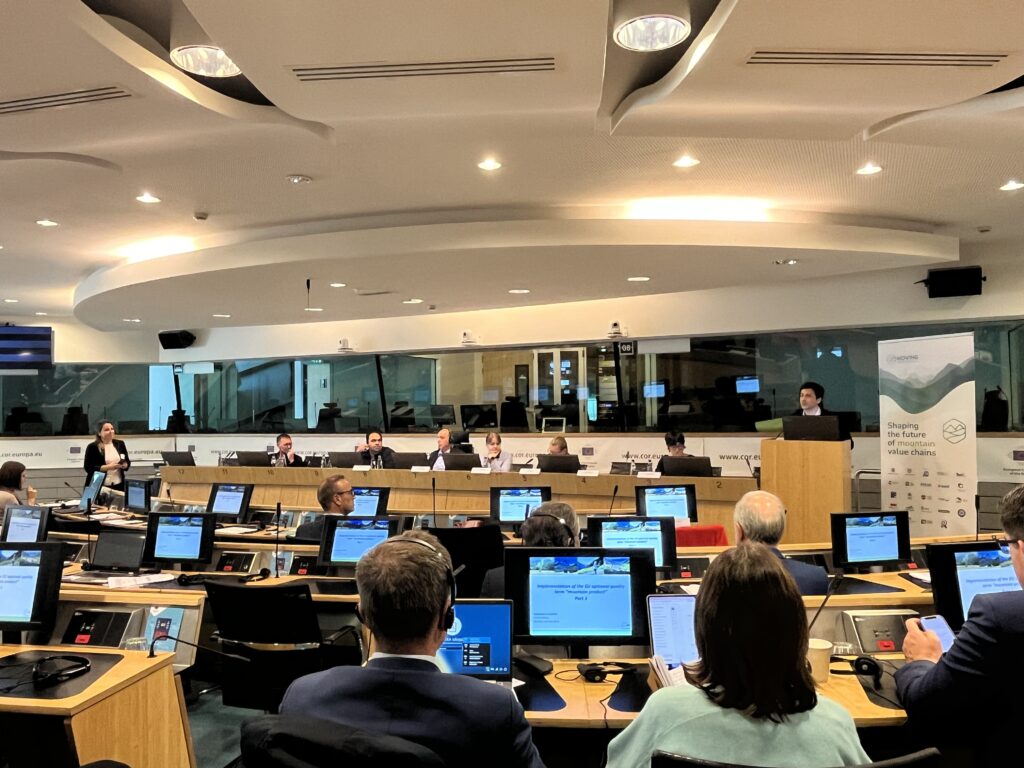10 years of the OQT mountain product, Euromontana calls for more effort in implementation

The Optional Quality Term “mountain product” has been supporting mountain producers for 10 years, but is not sufficiently promoted, argued Euromontana at the event “The new legal framework for EU Quality Products: opportunities and challenges for mountain and GI products“, held at the European Committee of the Regions and co-organised with MOVING, AREPO and oriGIn EU.
The Optional Quality Term (OQT), which has been operational since the 2014 delegated act, protects the term “mountain product” and helps to maintain local added value. It ensures that both raw materials and feed for farmed animals come mainly from mountain areas and that processing also takes place in these areas.
Euromontana, which has been working on the subject for 25 years and is the only organisation monitoring the implementation of the term, underlined that it is applied differently in the Member States according to national needs and complements other quality schemes. Nevertheless, as Guillaume Corradino, Director of Euromontana, pointed out, further efforts are needed to assess its impact and ensure that it is properly promoted among producers and consumers. A survey carried out in France, Italy and Romania by the EU funded project MOVING (through its partners AREPO and Highclere Consulting) confirmed that the OQT is mainly used by small producers and that it contributes to increasing consumer awareness and demand for these products. Although 90% of the producers surveyed declared they intend to continue using the label, the lack of public support and the insufficient promotion of the term were highlighted as weaknesses. Euromontana therefore recommends further impact assessment and data collection, more support from public authorities for use and communication, a better integration of the OQT into the EU’s Promotion Policy, and the introduction of official OQT logos in Member States that do not yet have one. Euromontana also underlined that it is crucial to gather additional feedback from member states and mountain producers, and to foster optimal national implementation, before considering whether changes in the EU regulation are needed.
Many mountain producers and elected representatives backed Euromontana’s messages, in particular MEPs Anne Sander and Irène Tolleret, who stressed that the Common Agricultural Policy and the Promotion Policy must give greater support to quality foods. In addition, Karine Gloanec Maurin pointed out that the European Committee of the Regions has always supported the implementation of the OQT and, more broadly, extensive livestock farming and pastoralism, which have their rightful place in the EU Farm to Fork strategy and sustainable food systems.
These comments were well received by Celine Keidel of the European Commission’s DG AGRI, who welcomed Euromontana’s work on mountain products. While pointing out that the OQT was designed to be an easy-to-use tool to reduce the administrative burden for authorities and producers, she was open to further efforts to promote mountain products within promotion calls to reduce fraud on mountain claims.
10 years after the publication of the delegated act, Euromontana will soon publish a new study on the OQT mountain to update the 2020 progress report. For more information, you can watch the recording of the conference and read our position paper on the Promotion Policy.